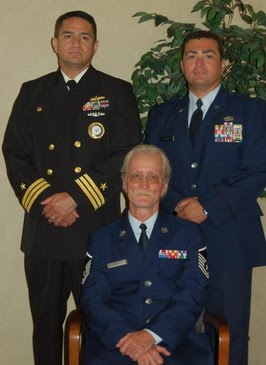 In my miscellaneous ramblings around the ‘net this morning I came upon two essays that are (a) a bit longish and (b) required some substantial thought…at least on my part. I suggest reading them in order, beginning with Robert Kaplan’s “On Forgetting the Obvious” before moving to “"The Emergence of a Separate American Warrior Caste," by Dymphna at The Gates of Vienna. The reason for the order of reading is simple: Dymphna draws heavily upon Kaplan’s essay and extrapolates meaning from the points Kaplan makes. The theme should be obvious from the title of the second essay. The title of Kaplan’s essay is less intuitive but has everything to do with the disappearance of, shall we say, the martial spirit in
In my miscellaneous ramblings around the ‘net this morning I came upon two essays that are (a) a bit longish and (b) required some substantial thought…at least on my part. I suggest reading them in order, beginning with Robert Kaplan’s “On Forgetting the Obvious” before moving to “"The Emergence of a Separate American Warrior Caste," by Dymphna at The Gates of Vienna. The reason for the order of reading is simple: Dymphna draws heavily upon Kaplan’s essay and extrapolates meaning from the points Kaplan makes. The theme should be obvious from the title of the second essay. The title of Kaplan’s essay is less intuitive but has everything to do with the disappearance of, shall we say, the martial spirit in Alas, in the unpredictable fog and Clausewitzian “friction” of war, to believe in something is more important than to be blessed by mere logic, or to have the ability for talented argument—even more important than the marvelous gear one carries. “Faith is the great strategic factor that unbelieving faculties and bureaucracies ignore”, retired Army Lt. Colonel Ralph Peters wrote in the Weekly Standard in February 2006. This is not a new idea, of course, just an obvious but too often forgotten one. It suggests particularly that we have forgotten Dostoyevsky, who wrote in The Brothers Karamazov that the signal flaw of the upper classes is that they “want to base justice on reason alone”, not on any deeper belief system absent which everything can be rationalized, so that the will of a society to fight and survive withers away.
Peters fears that Islamic revolutionaries believe in themselves more than we believe in ourselves. Terrorists do not fear the Pentagon’s much touted “network-centric warfare”, he writes, because they have mastered it for a fraction of a cent on the dollar, “achieving greater relative effects with the Internet, cell phones, and cheap airline tickets” than have all of our military technologies. Our trillion-dollar arsenal, he notes, cannot produce an instrument of war as effective as the suicide bomber—“the breakthrough weapon of our time.” If not Dostoyevsky, Kipling would have understood this. In the poem “Arithmetic on the Frontier” Kipling writes that as the hillsides of eastern Afghanistan teem with “home-bred” troops brought from England at “vast expense of time and steam”, the odds remain “on the cheaper man”, the native fighter. The suicide bomber is Kipling’s “cheaper man” incarnate.
[…]
Faith is about struggle, about having confidence precisely when the odds are the worst. Faith is the capacity to believe in what is simultaneously necessary but improbable. That kind of faith is receding in
The loss of a warrior mentality and the rise of universal values seem to be features of all stable, Western-style middle-class democracies. Witness our situation. The Army Reserve is desperate for officers, yet there is little urge among American elites to volunteer. Thus our military takes on more of a regional caste. The British Army may have been drawn from the dregs of society, but its officers were the country’s political elite. Not so ours, which has little to do with the business of soldiering and is socially disconnected from what guards us in our sleep. According to Marine Maj. General Michael Lehnert, nine
Dymphna picks up where Kaplan leaves off…or rather expounds upon some of the ideas Kaplan introduces, amplifying them with personal experience.
I would venture that the warrior class in this country is diverted somewhat into the police force and fire brigades. These are jobs requiring valor and extremes of courage. But their numbers are not enough to sustain us against our aggressors. Where are the officers to come from? Many elite schools don’t even permit ROTC components on their campuses, though they are more than glad to take federal monies. In a real world, schools which banned the military should not be eligible for federal aid. But then again, except for a few outstanding examples, our Imperial Congress is made up of people who definitely do not belong to Mr. Kaplan’s warrior class. Far from it: even those charged with military affairs are rude and demanding when they call officers from the Pentagon to appear before their courts to be admonished, blamed, and sarcastically ridiculed.
I grew up in a warrior town during the period of national service. It was simply expected: at some point in your late teens or early twenties, you gave two years to your country and then you went home. The warrior class then was distributive and many men remembered their service if not with fondness, at least with a wry understanding of how much they’d learned and grown in those years. It is seldom I have run across men of that generation who complained about the burden. For the most part, they were glad to have done it — to have it behind them.
That world is gone. Now our warrior class must be drawn from a shrinking population of those who believe in this country and share a common faith that it is worth defending. Those who do not share that faith also often don’t respect the motives or character of those who remain proud of their service to their country.
None of this is really new. It’s been going on for quite sometime, and the effect is cumulative. When I say the effect is cumulative, I’m speaking specifically of the issue Dymphna only grazes…that our power elites, while giving lip-service to the service and sacrifice of the warrior class, truly do not understand the ethos of that class, nor the guiding principles that motivate the warrior class, those being Duty, Honor, Country. I base this observation on what these people…our leaders…actually DO, as opposed to what they say. One can begin with their resumés and you’ll note that precious few of our leaders have actually served. There are exceptions, Thank God, but the exceptions only serve to prove the rule. Look a little deeper and you’ll find that far fewer of our leaders actually have sons or daughters that are serving today, for whatever reason. It goes back to that chasm both Kaplan and Dymphna discuss— the chasm between that separates our elites from the people that defend the nation: our warrior class.
I encountered widespread ignorance of, and contempt for, the military shortly after I retired in 1985 and went into the business world. Not in the organization I joined, I should emphasize. When I retired I went to work for Electronic Data Systems (EDS) when Ross Perot (a Boat and Barge School alumnus) still owned the company and pretty much called all the shots. Perot had an affinity for hiring retired and former (one-hitch) military types. As a matter of fact, during my interview process with EDS in Detroit (before I took the job) I met so many former Air Force Communications Command (AFCC) guys I knew from my past life that I thought AFCC had moved its headquarters to Detroit. We later took to calling the building I worked in “AFCC North.” But I digress…
So EDS was jokingly referred to as “a paramilitary organization,” most often by people who had no frickin’ clue as to why Perot liked military guys. Perot liked us because of those values I mentioned earlier… the values, the discipline, the attitude, the belief in something greater than yourself, which are all part of the territory. All of it. Stuff the Warrior Class takes for granted. Perot understood that, because he himself was a member of that Warrior Class, and he wanted people around him that shared, no, lived those values, as he did. And Perot built a damned successful business on the values of the Warrior Class. So, where am I going with this?
Ultimately, I don’t know. I want to believe the gap between the general population and the military isn’t as great as all that. But wanting to believe this, in the face of all evidence to the contrary, is foolish. Things really aren’t going to change in this country until college professors, doctors, and CEOs tell their sons to enlist, or to sign up for ROTC and accept that commission upon graduation. Until we get back to the point the Greatest Generation was at in 1941. Until people like my father are no longer the exceptions by encouraging their sons to serve, but the rule. Until we give the Warrior Class more than lip service in the form of those goddamned yellow bumper stickers and magnets. Until we believe in ourselves enough to fight.
I hope it’s not too late.




.jpg)




Wonderful essay, Buck. I've been thinking about this intensely for several months now. Thank you so much for the links and for your OWN personal experience. I'll be reading Kaplan and Dymphna with much interest. And I certainly do share your concerns. There is much to ponder over.
ReplyDelete...the signal flaw of the upper classes is that they “want to base justice on reason alone” Good ol' Dostoevsky. This "upper class" attitude has spread throughout the West because of our public school system and media. I've only come to understand it since I began to respect and admire the warrior class.
That's a lot to chew on this morning. I have not read Kaplan or Dymphna, but I will. In the meantime, I am reminded of the Old Testament stories where one generation fought and overcame the enemies to have the next generation not know or understand war. The second generation would fall to the enemy because of lack of knowledge - arogancy. So, the Bible admonishes us to teach our children about the battles we have fought, never letting them forget how to war. There is spiritual meaning here, but the literal stories are important too.
ReplyDeleteWell said Buck
ReplyDeleteWell said, Lou!
ReplyDeleteThanks, Lou, Bec, and Dan. There's more to say about this (like some anecdotal encounters I had with the "military as low-lifes" people), but organizing it into coherent thought...without rambling and/or getting off in the weeds... is difficult.
ReplyDeleteLike you, Bec, I've been chewing on this for quite a while. Finding and reading the two pieces I linked today just sorta set me off.
And thanks very much for your perspective, Lou. I hadn't given the subject any thought from that direction. You are so very right about the lessons the Bible teaches.
Excellent essay, Buck. You are so right in that we should be encouraging our sons and daughters to serve. Seems the prevailing attitude these days is that the military is reserved for those too dumb or too poor to go to a good college--or for those who can't seem to hold down a decent job. It's high time we return military service to the place of honor it deserves.
ReplyDelete